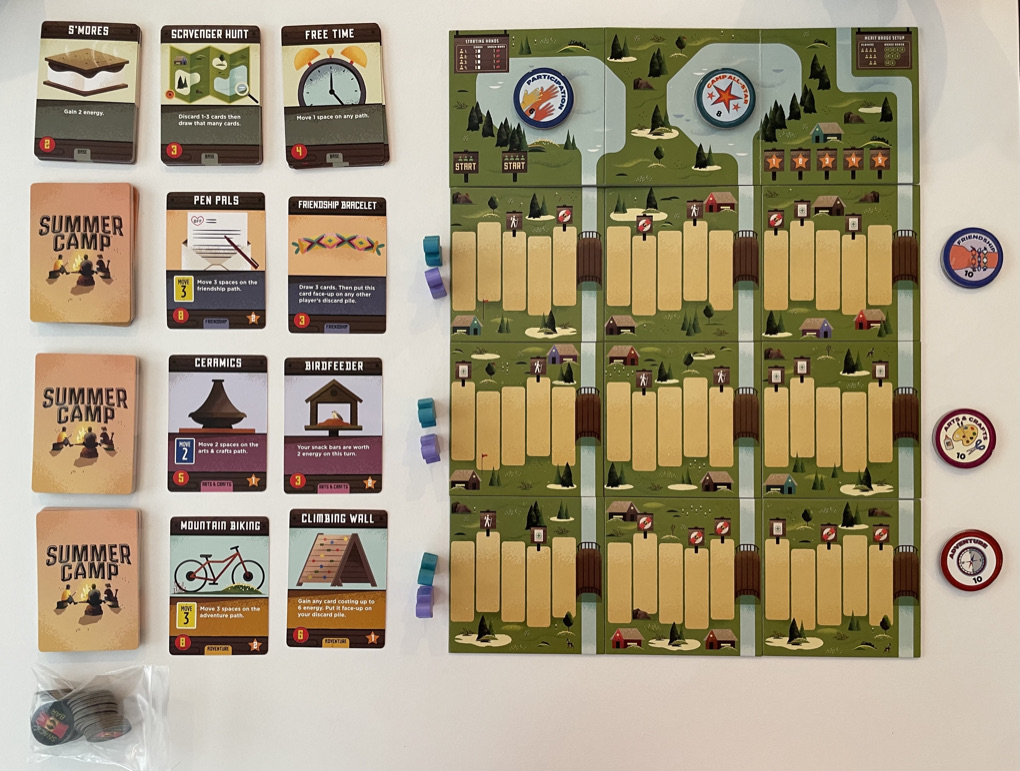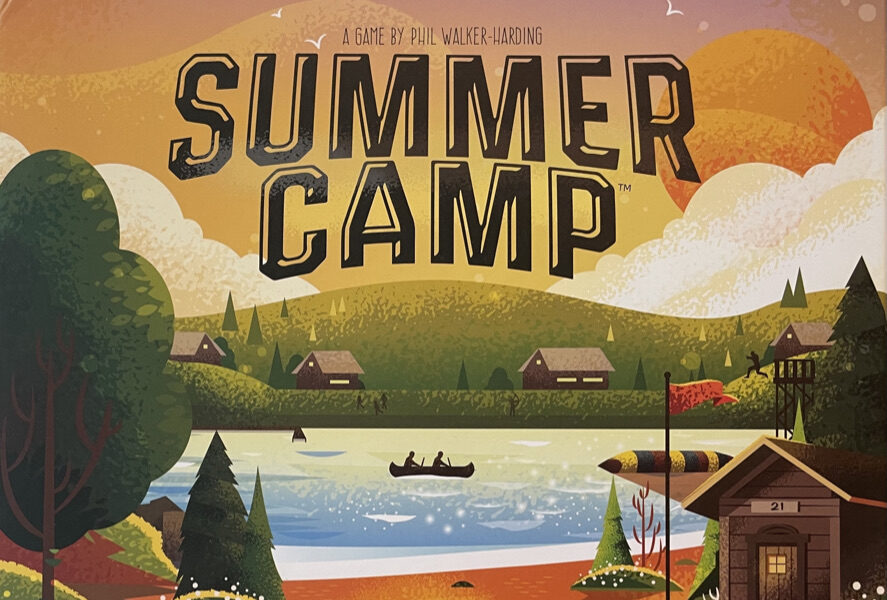I was randomly walking around Target a few weeks ago when the beautiful box art for Summer Camp caught my eye. Fully expecting this to be something uninspired when I picked it off the shelf, I was intrigued to see it was created by Phil Walker-Harding (Sushi Go!, Barenpark, Imhotep). Definitely not a random game, but what was it? Turns out, Summer Camp is a newly-released Target exclusive game featuring a fun theme and a deck building mechanic!
Deck builders. Honestly, it’s just not my favorite mechanic. Thanks to the theme and appealing art work, I leaped out of my comfort zone to give Summer Camp a chance, and I’m so glad I did. From the very first turn, I knew I was going to love Summer Camp. It’s absolutely simple to learn, but there is so much variety packed into this game I feel certain it’ll be loved for years to come.
What’s Summer Camp all about?
The short of it: Campers select their favorite activities to compete in for merit badges. The camper with the most victory points (gained mainly through merit badges and select cards) wins.
The long of it: At the start of each game you pick 3 activities to compete in. Options include: Outdoors, Water Sports, Cooking, Games, Friendship, Arts & Crafts, and Adventure. Next, you’ll use modular boards to create three paths – one for each of your activities. Your goal is to move each of your 3 pawns across their corresponding path in order to earn the merit badge at the end. As you cross over bridges along the path, you may also earn additional badges.
How do you move your pawn? This the heart of the game. Every camper will begin the game with a specific deck of cards. Some of these lucky cards grant the camper the ability to move their pawns along the path. Other cards are worth energy. Collecting energy will enable you to buy new cards to add to your deck. You need to optimize your deck to get your pawns across the paths the fastest!
Finally, the game end is triggered when the first person collects all 3 activity merit badges (play does continue until all campers have an equal number of turns). Every merit badge, and most of the cards, are all worth points. Count up all the points and the camper with the most points is the winner!

Let’s talk about replayability
Some games, even the ones we really love, can eventually become boring. Summer Camp has a few things going for it that will keep it feeling fresh. First, there are 7 activity decks, but you only use 3 in each game. This creates a lot of variation in the decks you’ll get to build over time. Second, the path boards are modular. At the start of each game, a camper will shuffle the 9 path tiles and create a new board to use.
What’s in the Summer Camp box
When I first opened Summer Camp, I was stunned. Why? Not one single cardboard piece to punch out. Every component was neatly arranged in cute little boxes and organized perfectly. I guess I’ve become accustomed to Kickstarter games that require a bit of prep work before you can get them onto the table!
- 8 boxes of cards (260 cards total, 1 base deck and 7 activity packs – pick 3 packs to play with each game)
- 34 merit badges (Each activity pack has 4 specific merit badges inside, 6 merit badges are general)
- 1 game board
- 9 modular path boards for variable gameplay
- 4 player boards
- 12 pawns ( 3 of each color)
- 24 snack bar tokens
- Starting camper patch (Would have loved this to be a real patch and not cardboard!)
Summer Camp Wrap-up
Summer Camp is my sleeper hit of the… summer! I had never heard of the game. I wasn’t expecting much because I’m not a huge fan of deck builders. This game has changed me. Like many family-friendly games, Summer Camp is not particularly complex. It’s easy to teach, and it’s got a cute theme that everyone in my family enjoys. Because of all of these things, I was able to just dive right into this game and truly embrace the deck building mechanic.
As you play, there’s a constant battle to add the right balance of energy and movement cards to your deck. The game progresses, and the balance changes. Suddenly, you have too many energy cards in your deck. Better add some cards to your deck that let you draw a few extra cards into your hand. You can truly feel the effectiveness of your deck as you play.
Yes, there are 7 activity packs that I listed above. The directions suggest you play with the Outdoors, Cooking, and Water Sports activity packs for your first game. Other decks have some slightly more complicated cards in them. The directions do include a reference guide for these more complicated cards. I’d also like to point out the activity packs are really quite thematic. For instance, the Friendship activity pack includes a lot of cards that force you to help out your fellow campers. Cute, and also frustrating sometimes!
Looking to play with kids?
Summer Camp would make a great introductory deck building game for younger kids. The box recommends 10+, and that may be accurate if they don’t have much gaming experience. Also, cards do have some light reading! Basic addition is needed to tally the final victory points.
Extra things to know
- 2 player games take roughly 40 minutes
- I setup the game by myself in about 7 minutes
- I put the game away by myself in less than 5 minutes
There’s a lot of deck shuffling in a game of Summer Camp. Perhaps this is normal for deck builders? I’ve never sleeved a board game, but I’m starting to think this may be the first. The quality of the cards in Summer Camp is fine, but not amazing. I can definitely see them showing wear and tear quickly!
Learn more!
To learn more about the rules and how to play Summer Camp, check out the directions pdf.
Stella and Tarrant via The Dice Tower put together a wonderful tutorial for Summer Camp as well!





One thought on “Summer Camp: A Deck Builder to Love”
Comments are closed.